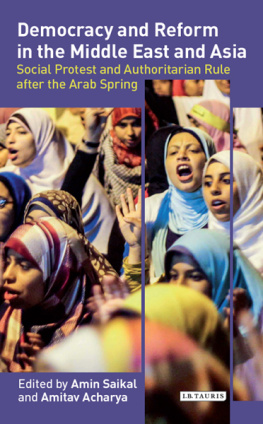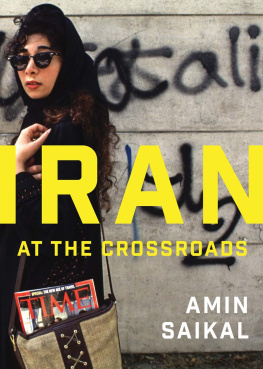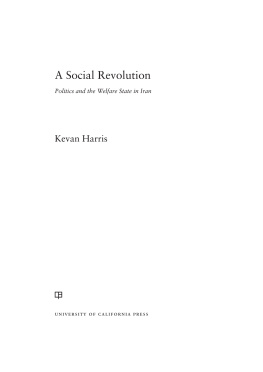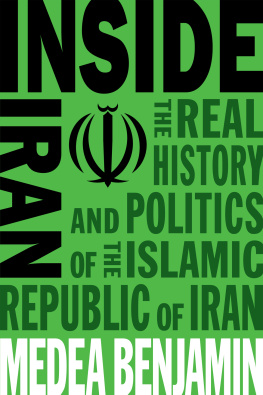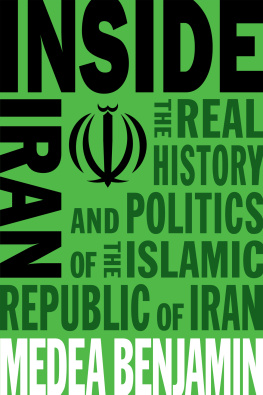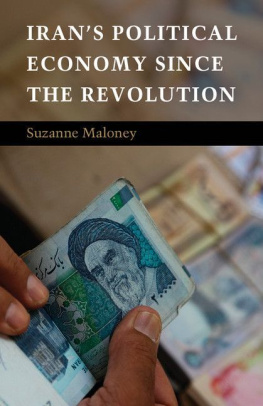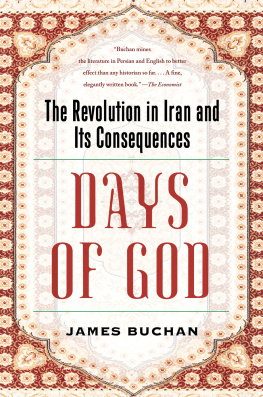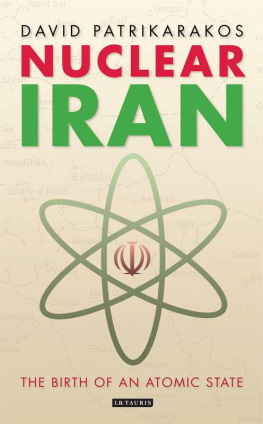Iran Rising
The Survival and Future of the Islamic Republic
Amin Saikal
PRINCETON UNIVERSITY PRESS
PRINCETON AND OXFORD
Copyright 2019 by Princeton University Press
Published by Princeton University Press
41 William Street, Princeton, New Jersey 08540
6 Oxford Street, Woodstock, Oxfordshire OX20 1TR
press.princeton.edu
All Rights Reserved
LCCN 2018936897
ISBN 9780691175478
British Library Cataloging-in-Publication Data is available
Editorial: Eric Crahan and Pamela Weidman
Production Editorial: Debbie Tegarden
Jacket design: by Spencer Fuller at Faceout Studio
Jacket photograph: Milad Tower in Tehran, during sunset. Courtesy of BornaMire / Getty Images
Production: Jacquie Poirier
Publicity: James Schneider
Copyeditor: Gail K. Schmitt
This book has been composed in Adobe Text Pro and Gotham
Printed on acid-free paper.
Printed in the United States of America
10 9 8 7 6 5 4 3 2 1
CONTENTS
PREFACE
The Islamic Republic of Iran has been in the eye of a political storm for forty years. Few states in the modern world have experienced as many domestic and foreign policy challenges, and have circumvented so many of them, as the Islamic Republic. These challenges have emanated primarily from two variables. One is the Islamic Republics revolutionary rhetoric and theocratic, but politically pluralist, system of governance, its fear of outside hostile actions, and the need to protect itself through various national and regional security-building machinations. The other is the way in which the regional and world actors, most importantly the United States, have treated the Islamic Republic as an oddity and have sought to protect their interests based on a view of the Islamic Republic as a destabilizing and metastasizing force in an oil-rich and strategically important part of the world. The two variables have mutually reinforced one another, resulting in the devastating Iran-Iraq War (198088), a stringent regime of international sanctions against Iran, driven largely by the United States, and semiglobal isolation of the country for virtually all of its life over the last four decades.
The pressures to which the Iranian Islamic regime has been subjected could not initially have augured well for its long-term survival. Yet, it has managed to deal with these in an increasingly pragmatic rather than ideological fashion in order to neutralize or get around them, while persisting with its base of religious legitimacy. It has pursued the jihadi - ijtihadi , or combative/reformist, approach of its founder, Ayatollah Ruhollah Khomeini, in the conduct of Irans domestic and foreign policy, transforming the country into an influential actor or, according to a particular set of criteria, an important middle power in the region. It has succeeded in building such domestic structures, processes, and resources capability and a foreign policy posture that have enabled it to ensure order at home and deter aggression from outside.
This endurance and capability have not been free of costs for its people and its international standing. Given Irans abundant natural resources and human capital, many seasoned critics have argued that the theocratic nature of the Islamic Republics political order has held back its subjects from achieving their full potential and from ensuring the development of their country as a progressive and prosperous state. They contend that the Islamic system has proved to be as autocratic and corrupt in many of its operational aspects as that of the Shahs dictatorial rule. As such, the Republic has indeed a long way to go before a majority of its people could enjoy a standard of living that would enable them to remain solidly behind their Islamic government out of devotion rather than coercive obligation. Undoubtedly, the Islamic Republic has had a very turbulent journey so far, and there is no evidence to suggest that its path of change and development is likely to be less rocky in the foreseeable future.
What makes the Islamic Republic tick? What direction is it likely to take in its evolution, especially in light of the changing dynamics of the regional and international strategic environment? In the years ahead, it is bound to face a range of hostilities and opportunities. Its ability to deflect hostilities and leverage opportunities will depend on whether it continues on its seesawing jihadi - ijtihadi path of evolution, or whether one approach will dominate more than the other.
I have been researching and writing on Iran for most of the forty years of my academic life. My first major work on the country was The Rise and Fall of the Shah, published by Princeton University Press (PUP) in 1980, with an abridged paperback edition published in 2009. The motivation for the current volume came to me after delivering a lecture at Princeton University in 2015. Eric Crahan of PUP encouraged me to develop the ideas in my lecture into a substantial volume to mark the fortieth anniversary of the Iranian Revolution of 197879, which toppled the Shahs rule and replaced it with Khomeinis Islamic government. This book takes up the tale of the development of Iran in both regional and international contexts from where The Rise and Fall of the Shah s discussion ended.
The book is not designed to advance a major theoretical discourse or examine certain theories of state building or international relations with a focus on Iranian developments. Its primary objective is to provide a comprehensive discussion and analysis of the evolution of the Islamic Republic of Iran over the last four decades. However, various relevant theoretical tools and concepts are deployed to unpack the complexities of the Republics domestic and foreign policy situation against the backdrop of complicated but changing national and international settings. The books approach is multidisciplinary, involving usage of those disciplines that are conducive to an in-depth understanding of the vicissitudes and endurance of the Islamic Republic. The main theme running through the volume is that of the jihadi - ijtihadi within the framework of which the story of the Islamic Republic is best explained and analyzed.
In writing this volume as a product of years of accumulative knowledge and contemplation, I owe a depth of gratitude to many individuals and institutions. In Iranthe country that I have visited and where I have carried out research numerous timesI am very thankful to a number of policymakers, academics, and friends who have continuously enriched me with their knowledge, analyses, and gracious hospitality. I cannot mention all of them, for most are still in active service and would not want to be named. Even so, it is appropriate to express my sincere thanks to the current foreign minister, Javad Zarif, for enlightening me about the Islamic Republics foreign policy issues, as well as the Institute of Political and International Studies (IPIS) and Islamic Culture and Relations Organization, whose scholars and foreign service personnel have been more than willing to discuss with me the affairs of their country freely and frankly.
I am equally grateful to many specialists and current and former policymakers in the United States, including most importantly the former US undersecretary of state Thomas Pickering, and a number of friends at Princeton University, including the director of LISD Wolfgang Danspeckgruber, whose knowledge of the region and depth of understanding of US policy behavior toward it have been invaluable to me.
Meanwhile, had it not been for the valuable support of three young and brilliant research and editorial assistants, I would have struggled to complete the manuscript for this book on time. I owe a world of gratitude to Andrew Feng for being a very meticulous and energetic researcher; to William Jenkins, for his valuable knowledge of Iran and the Persian language and for reading a draft of the manuscript; and to Stephanie Wright, for her enormous editing skills and insightful comments.
Next page

